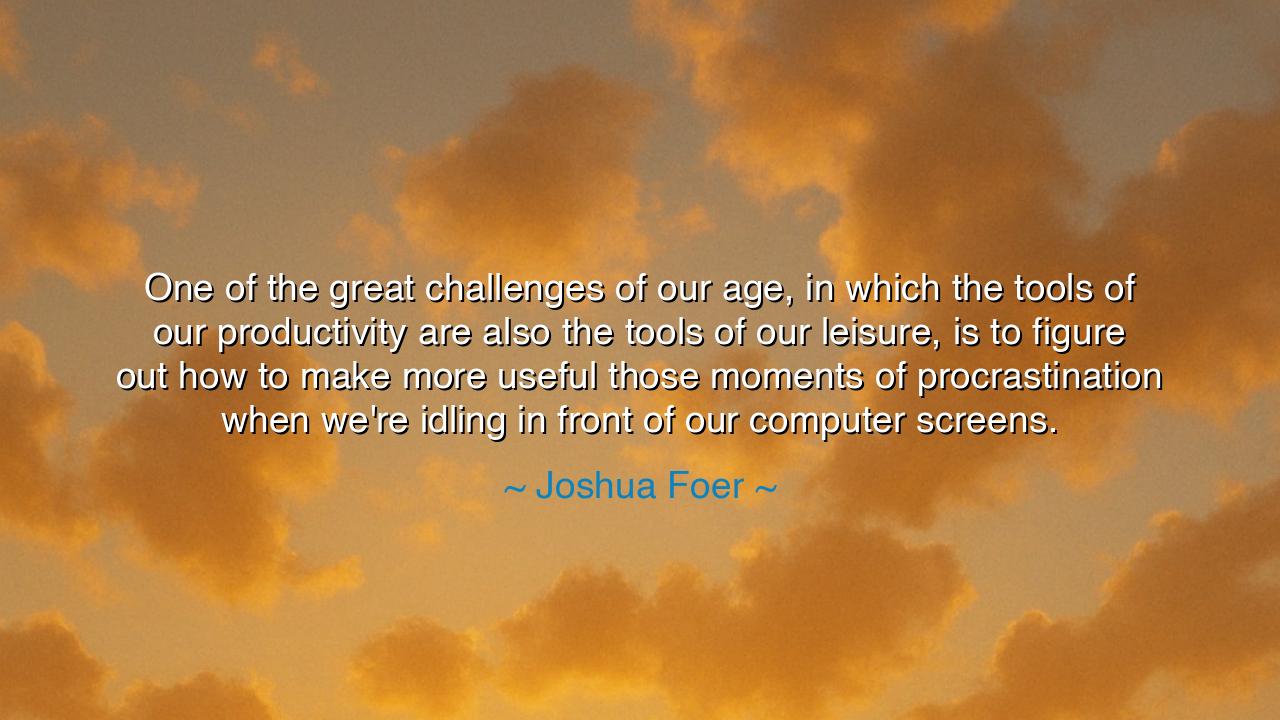
One of the great challenges of our age, in which the tools of our
One of the great challenges of our age, in which the tools of our productivity are also the tools of our leisure, is to figure out how to make more useful those moments of procrastination when we're idling in front of our computer screens.






In the words of Joshua Foer, “One of the great challenges of our age, in which the tools of our productivity are also the tools of our leisure, is to figure out how to make more useful those moments of procrastination when we're idling in front of our computer screens.” These words, though born of our modern world, echo with the timeless struggle between creation and distraction, focus and indulgence. Foer, a writer and journalist known for exploring the depths of memory and human potential, speaks not merely of technology, but of the battle for attention—a battle that has defined every age, but now unfolds on glowing screens in every hand and home. His reflection captures a truth of our time: that we live in an era where the very tools meant to empower us can just as easily ensnare us.
To the ancients, this paradox would have seemed familiar. The philosopher Seneca once warned, “It is not that we have a short time to live, but that we waste much of it.” His caution rings even louder in our digital age, where the moments between work and rest blur into endless scrolling, clicking, and consuming. Foer’s observation reveals this quiet tragedy—the fusion of productivity and leisure in the same device, the same space, the same instant. The pen and parchment of old demanded attention; the screen offers both creation and escape. Thus, the modern soul must learn a new kind of discipline: not merely to labor, but to use even idleness wisely.
Foer does not condemn procrastination outright; he understands it as part of the human rhythm. Just as the field must lie fallow to regain its fertility, the mind too requires moments of pause. But he calls us to redeem those pauses, to transform idle moments into opportunities for reflection, discovery, or creation. When we linger before our screens, we stand at a crossroads—one path leading to distraction, the other to curiosity. We can wander aimlessly through noise, or we can choose to feed the soul. The challenge, he says, is not to banish idleness, but to make it useful, to turn delay into contemplation and curiosity into learning.
Consider the story of Leonardo da Vinci, the restless genius of the Renaissance. History tells us that Leonardo often left his work unfinished, his mind drifting from project to project. Yet his so-called procrastination was not waste—it was fertile wandering. In those unhurried moments, he studied clouds, dissected flowers, and dreamed of flying machines. His idleness was not absence of work, but a deeper engagement with wonder. So too, Foer invites us to transform our own wandering—our scrolling, our clicking—into something that feeds rather than depletes us. The difference lies not in the tools, but in how we use them.
The modern machine, whether computer or phone, is neither demon nor angel. It is a mirror of our will. It can produce art, connect minds across continents, or trap us in cycles of empty pleasure. Foer’s wisdom reminds us that every moment spent before the screen is a choice between awareness and apathy. To “make more useful those moments of procrastination” is to reclaim control of our attention—to turn idle time into reading, learning, creating, or simply breathing with intention. The ancients sought balance between labor and leisure; in our age, we must rediscover that same balance in a new landscape of light and code.
There is power in this challenge. To master one’s attention is to master one’s life. Procrastination need not be a chain; it can be a compass, pointing us toward what our hearts truly crave. Often, the things we delay are not meaningless, but monumental—they demand courage, not time. When next you find yourself drifting on the tide of digital distraction, pause and ask: what could this moment become? Could it be a moment of learning, of reflection, of creation? For even the smallest act of mindfulness reclaims a fragment of freedom.
The lesson, then, is this: be the master of your tools, not their servant. Use your idle moments as the ancients used silence—to listen, to think, to prepare the ground for new growth. When the world tempts you toward endless distraction, remember that your time is sacred, your attention divine. Transform the idle glance at a screen into a spark of curiosity, the pause in work into a breath of insight. For the mind that learns to turn procrastination into purpose will not only conquer the age of machines—it will rise above it, carrying into the future the oldest and greatest art of all: the art of being present.






AAdministratorAdministrator
Welcome, honored guests. Please leave a comment, we will respond soon